Social media is full of fake profiles, and if you think that someone is pretending to be you on Facebook, then you need to find out who that person is first. Second, it’s better to alert your friends about that fake account that uses your name and photo. You’re not alone in this situation. There are so many cases where scammers try to look like someone else on Facebook by copying their exact details, like first name, last name, images, and more.
In this guide, I’ll show you what you can do if you suspect that someone is impersonating you on Facebook. After that, you’ll find helpful tips and tricks to see the real identity of that anonymous user and the steps to take action.
What to do first with the imposter?
In order to do any investigation on that user who pretends to be you on the social media platform, you have to find out who they are. So, use a dedicated people search engine that can help you figure out who that person is using their username on Facebook. Of course, the name there is yours, and you may also use it to detect any other account made by the same impersonator you want to identify.
This is the best way to find out who is pretending to be you on the Facebook app. If that guy, for example, has other profiles in your name on Instagram or TikTok, you may find them as well. That’s because these advanced algorithms search the web for profiles linked to usernames, names, or phone numbers. Then, they may have access to other sources of data that are not easy to get publicly. All of that can help you determine the real name of that impersonating person through Internet tools and services.
In many cases, many scammers on dating sites have used other people’s names for catfishing. So, they put everything under their fake profiles to look exactly the same as a real person on Facebook. Even more, Facebook dating is also not protected from these impersonators. Consequently, you may find your partner’s profile there even if they did nothing wrong on FB. It’s just that scammer who steals their names and details for love and dating scams.
Notify your friends and family members
This is a crucial step when it comes to finding out that someone is trying to look like you on any social platform. Start by sending a message to all your friends, or one by one if you prefer only telling the most important users on the list. You can also send them a text message to their phone telling them that another person is trying to impersonate you through Facebook.
Make sure you tell them not to reply to any messages from other accounts in your name. I’m not talking only on FB but through other social apps until you tell them later. That could easily prevent your list of contacts from being used to hack your accounts or any other online threats.
The imposter may try to contact someone from your Facebook friend list, asking them for money or other things. That’s what you don’t need in the end. And the best way to prevent identity theft is to inform your relatives and associates about the problem. They may have had similar issues in the past. So, your friends may support you by telling you their own tips and strategies to deal with the situation.
If some of your relatives accepted friend requests from that impostor, tell them to block the user on FB and report them. The number of identity theft reports to the FTC has doubled in the last couple of years. So, everyone should be aware of that.
Report the impersonating account to Facebook
Facebook has a dedicated section for reporting fake users. So go ahead and visit the exact profile. Next, click on their account profile or name to access the linked page. After that, click on the Three dots to get some suggested actions to take. Next, choose “find support or report“, like the following screenshot.
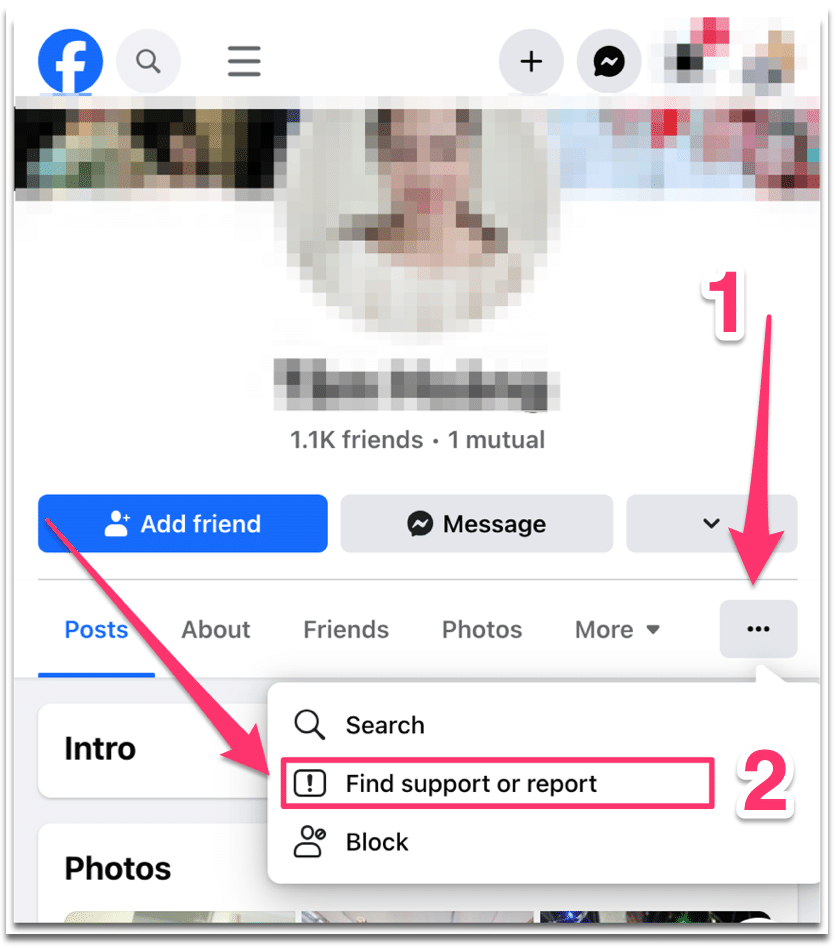
Now, you’ll see a list of options. Click on the first option, which is “Pretending to be someone“, like in the next example:
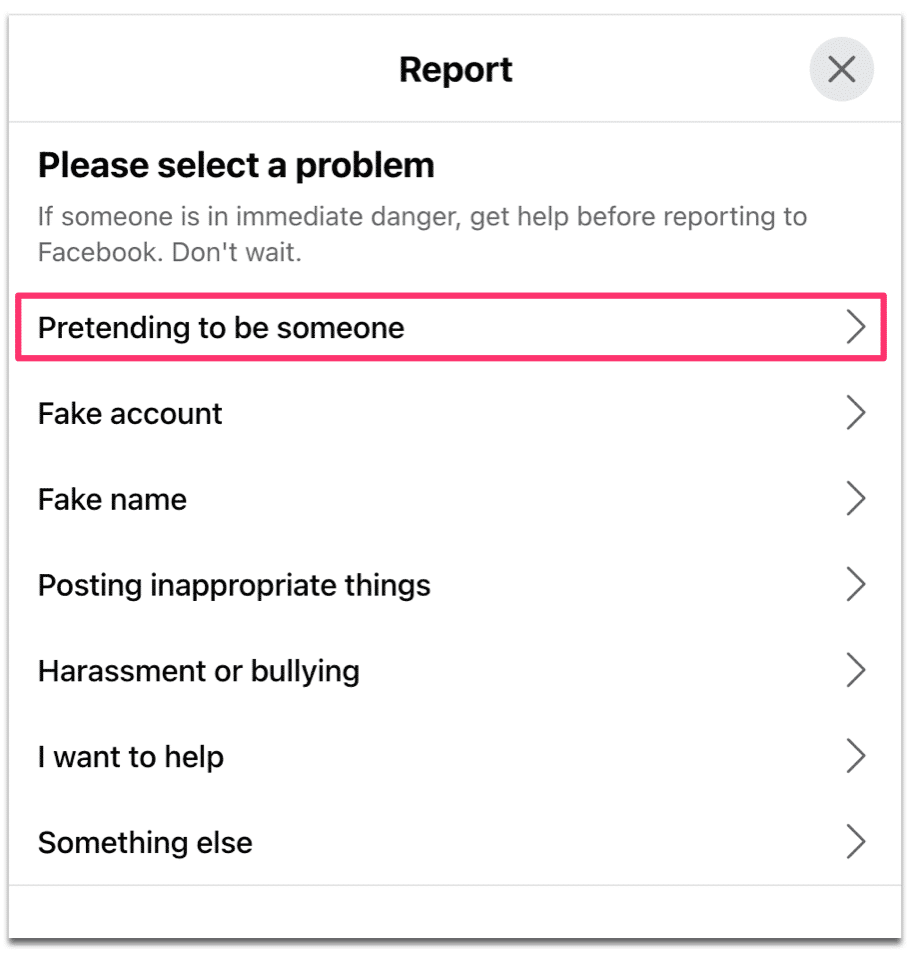
After that, you’ll see suggestions about the real account, so choose “Me“.
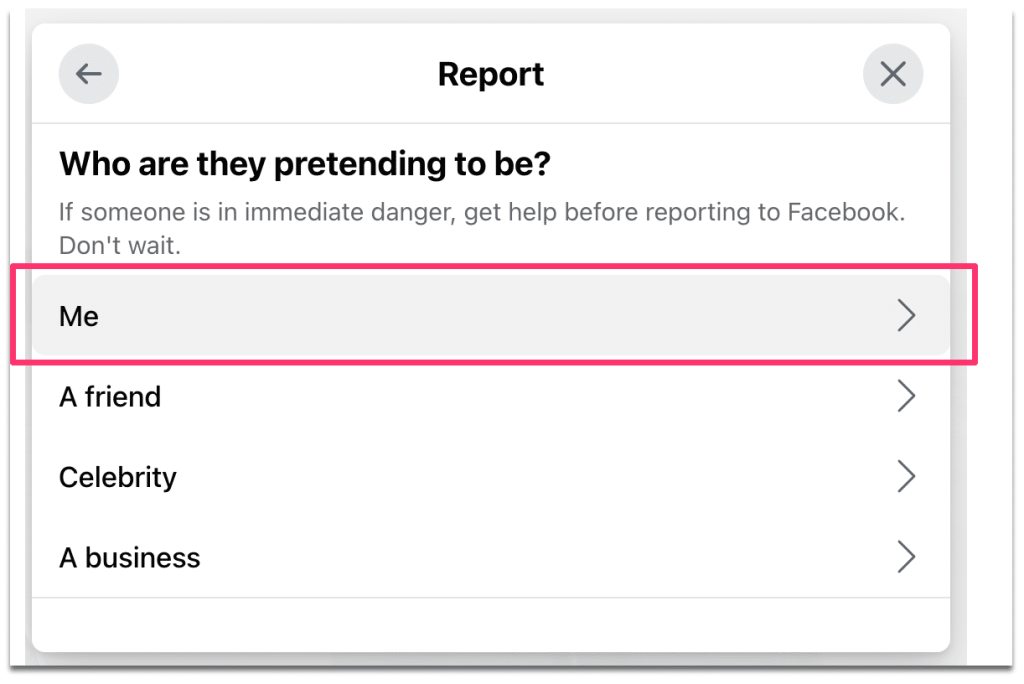
Now, follow the steps, and provide the Facebook support center with information about the account. The user behind it may add other details that can help. For that reason, make sure you inform them about everything, like the first time you found the page, etc…Next, they’ll contact you to confirm your identity if you haven’t done that before.
Keep in mind that reporting the imposter profile doesn’t guarantee to delete it immediately on Facebook. That may take a few hours or days, depending on how the Facebook help center works.
If the fake Facebook account has lots of followers, even more than your original profile, then, it’s possible they have been pretending to look like you for months or years. In this case, there could be potential issues linked to online scams, unfortunately, in your name. So, always report the case to the FBI and local authorities. But before doing that, take a screenshot of the fake account with details, photos, and everything. You can also take note of the information on that impersonating profile, like the username, Facebook user ID, posts, photos, videos, and more.
Report identity theft
The Federal Trade Commission has a dedicated web page on its site for identity theft. You can fill out the form and report any fraud or the details of the person impersonating your social media accounts.
There will be a “Report Now” button like in the next example, so click on it. Or scroll down on that page until you find the fraud report link.
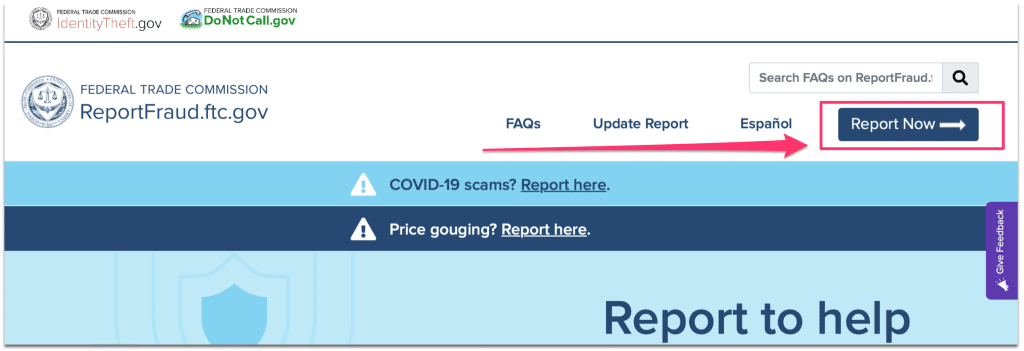
Now, choose the right fraud type to report, which is “Impersonator” in this case. Immediately, the FTC system will suggest other subcategories, like the following:.
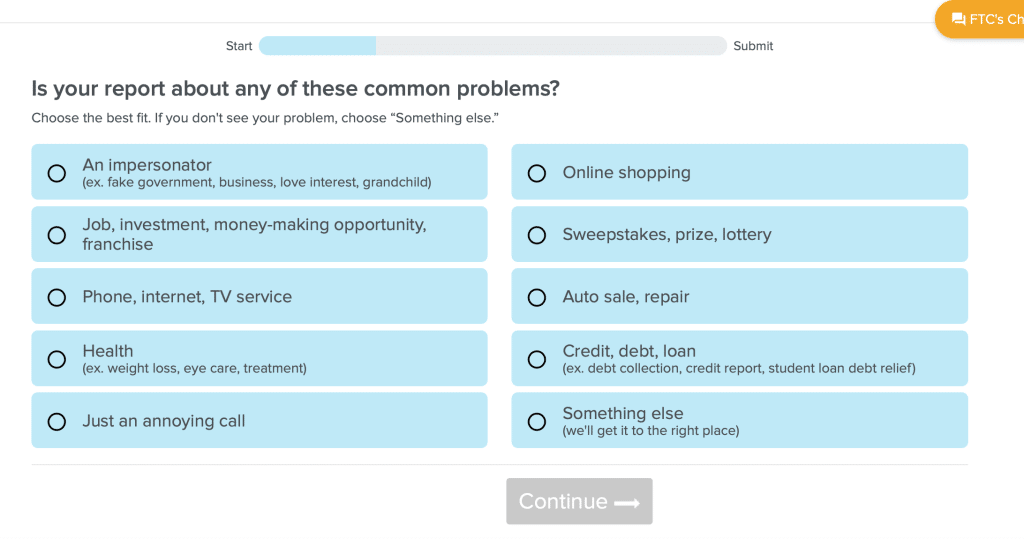
You can select “Something else” and type your message with explanations and details about the matter. Also, someone else, probably a family member, can help you fill out the report. So, a relative could use that FTC page, and under that section called “Find Who were they pretending to be?” Find the appropriate person who tries to represent you without permission. That includes your child, friend, colleague, business, celebrity, dating site user, etc.

After clicking the “Continue” button, the FTC website will ask you for details about the impersonator person. So, provide them with additional details such as:
- Any payment you made to them
- The date of the transaction
- If you have a conversation or chat with the impersonator, add it with a screenshot
- Their Facebook account username and URL
- Any photos
- Add any Facebook post they made in your name
- And everything in your mind about them
After that, the Federal Trade Commission will confirm the reception of your report and will treat it.
Make sure your details are up to date
After reporting the fake account, your name, and photo to Facebook, it’s time to check your details. See if you posted your phone number or email in recent posts; the scammer may try to use your number and even email address to contact others. There are many problems linked to email pushing and other related online threats.
Also, try to verify your phone number with Facebook if that’s not done. Having a working phone number can help you recover your account in any case. Also, make sure you have the correct email in your account details. In fact, that email should be accessible in case of emergencies. Facebook, for example, may send you notifications about suspicious login attempts through the email in-file.
What if they’re impersonating you on other apps?
Finding out that a certain person is trying to pretend to be you on Facebook should make you aware of related cybersecurity problems. That suspicious user could be trying to copy and paste your exact personal details on other fake accounts. For that reason, don’t stop on Facebook only because you discovered that fake profile. The same user might have dozens of hidden profiles on other social networks like Instagram, YouTube, Twitter, or more in your name.
There are some things you can do to see if someone is trying to look exactly like you on social media. The best of them is to use the search tools in the first section above. However, when you have doubts about using your photo on these fake accounts, then, try reverse image search like Social Catfish. That tool lets you upload your photo and discover if someone else is using it online without your permission. Thus, you may uncover other hidden accounts that use your photo in a few minutes.
That investigation should give you a clear idea about the real person who impersonates you. Furthermore, it’s possible to know their name, address, and contact numbers when possible and even see their potential images.
Also, I encourage you to check with online groups on Facebook or other sites for details about scammers. These people may have tried to impersonate other users on FB, and others may have gained access to their names and locations. So, you can uncover the identity of the person who created the fake accounts in your details.
Conclusion
When you discover that a person is trying to pretend to be you on Facebook, identify that user first with the above guide. That will help you trace their real name, location and even get some real photos about them.
Also, have a look at your FB account or page details and see if people can extract details from it, such as contact numbers or emails. Then, tell your followers and friends about that fake account. So, they may block the impersonator before doing anything in your name. All that should be helpful in finding out the person’s identity behind the fake account in your name or photos.
